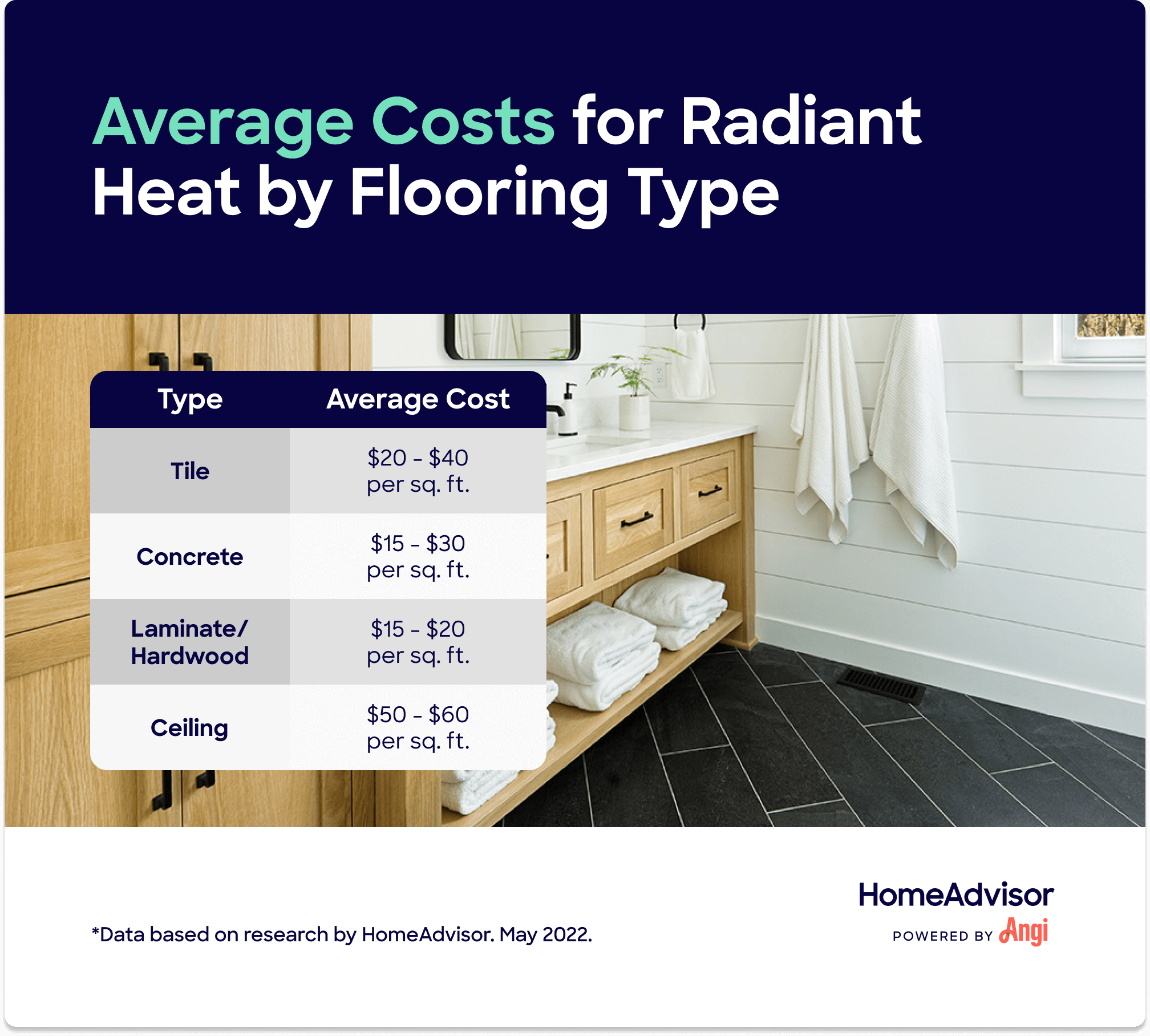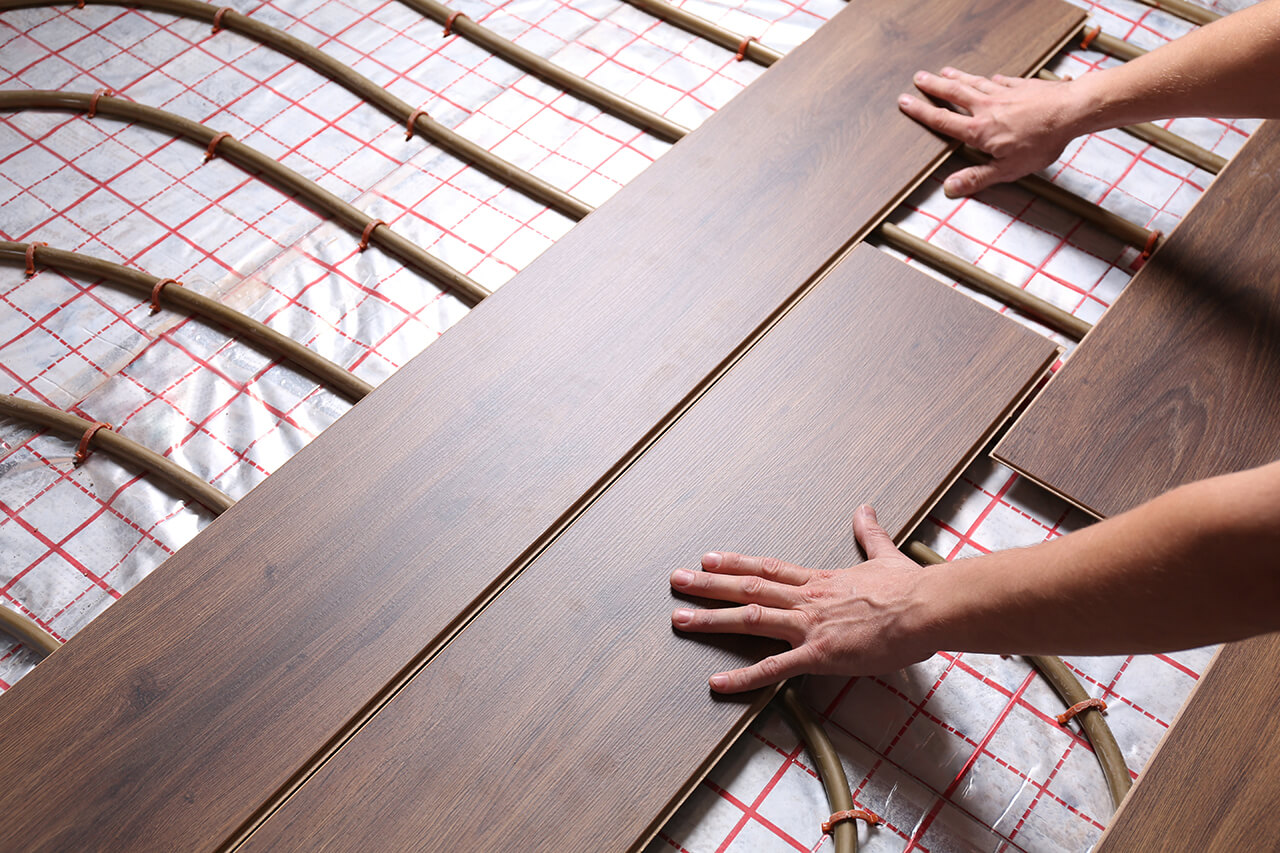How Much Does Radiant Floor Heating Cost?
Typical Range:
$1,682 - $6,656
Typical Range:
$1,682 - $6,656
Cost data is based on actual project costs as reported by 94 HomeAdvisor members. Embed this data
.
.
.
.
.
.
.
.
.
.
.
.
.
.
.
.
.
.
.
.
.
.
.
.
.
.
.
.
.
.
•
•
•
•
Updated May 26, 2022
Written by HomeAdvisor.Installation of radiant floor heating costs around $4,169 on average. Depending on the type of heating system, how many rooms you’d like heated, and how much control you’d like over the heating system, you should expect to pay $1,682 and $6,656. Those looking to install radiant floor heating throughout the entire home should budget upwards of $14,000 to $48,000.
Let's calculate cost data for you. Where are you located?
Where are you located?
| National Average | $4,169 |
| Typical Range | $1,682 - $6,656 |
| Low End - High End | $200 - $14,000 |
Cost data is based on actual project costs as reported by 94 HomeAdvisor members.
As with any contractor job, quite a few factors impact the final cost of installing radiant floor heating, including project complexity, whether you opt for temperature zones, and your current water heater setup.
There are several different types of radiant floor heating systems on the market. Depending on where you live, your preferred energy source, and your budget, you’ll need to choose between the five current systems (more on this below):
Hydronic
Electric
Geothermal
Solar
Propane
Radiant floor heating costs anywhere from $6 to $20 per square foot. To heat a 2,300 square foot home (the average size of a U.S. home) you should expect to pay anywhere from $13,800 to $46,000. The general rule of thumb is: The more square footage you decide to heat, the less you’ll pay per square foot.
If you want to install radiant floor heating throughout the home—or in several rooms—you may consider incorporating temperature zones. Temperature zones allow you to set the desired temperature of the water to heat a specific room or area, such as a primary bedroom and guest bathroom.
Adding a temperature control system may increase the project's total cost by $1,000 to $15,000, depending on the number of zones desired. This setup also requires a smart thermostat or programmable thermostat to maintain the temperatures of each zone. The cost of a smart thermostat is around $350 on average.
Radiant heating helps in the cooler months, but you’ll get the most for your money if you can use your system year-round. Add a supplementary radiant cooling system that goes into the ceiling to help cool down the home during the warmer months. Cool air falls rather than rises, so radiant cooling requires overhead installation.
Labor, the chiller and dehumidifier, and basic piping materials add another $35 to $45 per square foot to install radiant cooling. This pricing reflects only the portion dedicated toward cooling rather than the project's entire cost.
Rather than starting from scratch and using your own custom layout for radiant floor heating tubing, you can opt for pre-fitted subflooring. You’ll significantly decrease labor costs with this option because there’s no need to bend pipes and destroy your current flooring.
Keep in mind that this solution isn’t always available and may not be the best option for your home.
Expect to pay anywhere from $550 to $2,500 for labor costs on a radiant floor heating project. It takes around 12 hours of labor for every 1,000 square feet of heating material to complete the job.
Licensed plumbers charge between $45 to $200 per hour, depending on the project and their quotes. It’s always best to get at least three quotes from local plumbers to compare prices.
When installing a radiant floor heating system, part of the process for installing the system is ensuring your water heater can keep up with the new demand for hot water. If it doesn’t, the cost of installing a new water heater is around $770 to $1,450. You also can install a boiler, which costs around $3,500 to $7,700.
You have five main types of radiant heating systems available. You’ll need to decide based on your climate, house type, and energy costs in your area.
| Type of Radiant Heating System | Price Per Square Foot | Total Cost |
|---|---|---|
| Hydronic | $6 – $20 | $19,000 – $48,000 |
| Electric | $8 – $15 | $19,000 – $36,000 |
| Geothermal | $4 – $12 | $9,500 – $27,000 |
| Solar | $3.50 – $8.50 | $3.50 – $8.50 |
| Propane | $6 – $20 | $2,600 for the unit |
Hydronic floor heating systems cost around $6 to $20 per square foot. Hydronic radiant floor heating systems use hot water supplied by a hot water heater or a boiler to move through pipes to warm the home. Hot water tends to hold onto heat well, making it decently energy efficient and available for a large number of homeowners.
The total cost to install a hydronic floor heating system throughout the home will range from $19,000 to $48,000.
Electric radiant floor heating systems cost roughly $8 to $15 per square foot. While it uses more energy to constantly keep areas warm, the upfront cost is lower. At $19,000 to $36,000 for the entire home, electric heat is affordable for most homeowners.
Geothermal radiant flooring systems cost around $4 to $12 per square foot or $9,500 to $27,000 for the entire home. Geothermal radiant floor heating is available throughout the United States and doesn’t require direct access to springs and wells.
The cost to install a solar radiant heating system runs about $3.50 to $8.50 per square foot. Solar heating systems for the entire home will cost around $8,000 to $19,500.
Keep in mind that solar heating systems aren’t ideal for dark and gloomy areas in the winter because they rely on the sun to harness energy, so this option is best for climates with lots of sunny days.
Propane underfloor heating systems tack onto hydronic systems to heat the home. The cost of propane underfloor radiant heating systems is around $2,600 for the unit itself plus the $6 to $20 per square foot installation costs for the hydronic piping.
Ideally, propane is a great option where gas usage has a lower cost than normal electricity usage.
Maybe you’re only looking to install radiant heat flooring in certain areas of the home like a bathroom. This awards you significant savings in labor and materials.
The cost of installing a radiant floor heating system over bathroom tile is around $20 to $40 per square foot. Heated bathroom tile requires extra flooring materials, typicaly concrete, to ensure the tile flooring withstands heat. This may cause an issue in height variance between the bathroom and the floor directly connected to it.
Installing a radiant heating system in concrete flooring will cost around $15 to $30 per square foot.
Laminate or hardwood underfloor radiant heating will cost around $15 to $20 per square foot.
The price of radiant ceiling panels is $50 to $60 per square foot, with lower voltage and wattage versions being the cheapest. One to 2 panels per room is sufficient, and it takes one to three hours to install per room. Typical panel sizes are between 2 by 2 and 2 by 6 feet.
The total project price for installation and materials is $300 to $1,400 per room.
While it may seem an oddball way to heat your home, radiant heating is typically one of the most energy-efficient ways to keep you warm when it’s cold. Rather than constantly pumping warm air into the home with an HVAC system, radiant heating focuses on warming the air already in the rooms.
The average price to run a radiant heating system for 24 hours non-stop is $3 compared to $20 for traditional air heating systems. Water can hold 3,500 times the heat than air can. This allows you to operate your radiant floor heated home six to eight degrees lower than a standard air-heated room.
Because you can set the temperature zones throughout the home, you often get even heating across rooms. Your primary bedroom won’t feel like a sauna compared to your living room.
Radiant heat flooring systems contain fewer moving parts than a standard HVAC unit. The piping throughout the system will last decades compared to air ducts as well. The cost to repair a radiant heating system is around $1,300 on average, but this varies depending on the type of repair. Realistically, radiant heating repairs average $90 to $2,500.
You can save some money by purchasing your radiant heat flooring project materials. However, you’ll still need to contact a licensed plumber for the installation process. Failure to install pipes or temperature controls throughout the system can quickly lead to flooding, fire, and electrical hazards.
| Materials | Average Price Per Square Foot |
|---|---|
| Professional Installation w/ Materials | $11 |
| DIY Electric Radiant Heating Materials | $6 |
| DIY Hydronic Radiant Heating Materials | $2 |
The average cost of installing a radiant floor heating system in new construction will fall in the $19,000 to $48,000 range. However, you’re likely to save a significant amount of money in labor, as it’s much easier to install when there’s no flooring or walls to contend with.
No, hydronic radiant heated floors actually use significantly less energy than standard heating systems. This is thanks to water's ability to retain heat up to 3,500 times more than air. However, this does not apply to all radiant heated flooring systems.
Baseboard heating typically refers to the location of the heater, which is towards the baseboard on a wall. Hot air rises rather than falls, so it often makes more sense to pump hot air into the room this way rather than having it come in from above. Baseboard heating costs around $800 for a single room.
Radiant floor heating uses water throughout the floor to heat a room. The radiant floor system heats up the surrounding air rather than constantly battling cold air pushing warm air up.
Forced-air heat systems will cost around $2,300 on average for the entire home. This is compared to the cost of installing a radiant heat flooring system, which starts at $14,000. The cost of running a radiant heat flooring system for 24 hours is $3, while forced-air energy consumption is about $20.
The best type of flooring for radiant heating is tile and stone. These two materials transfer heat the quickest, making it quicker to heat a room. Though wood, laminate, vinyl, carpet, and rubber will work, they’ll take more energy and time to produce the same results.
You need to install radiant heat flooring in every room and area of the home to heat the entire home.
Tubing and coils used in radiant heat flooring last 20 to 35 years. Boilers used for hot water systems have a 15- to 20-year lifespan.
A typical single-car heated driveway of 200 square feet costs $2,400 to $4,200 per square foot, including the thermal components, materials, and labor time.

